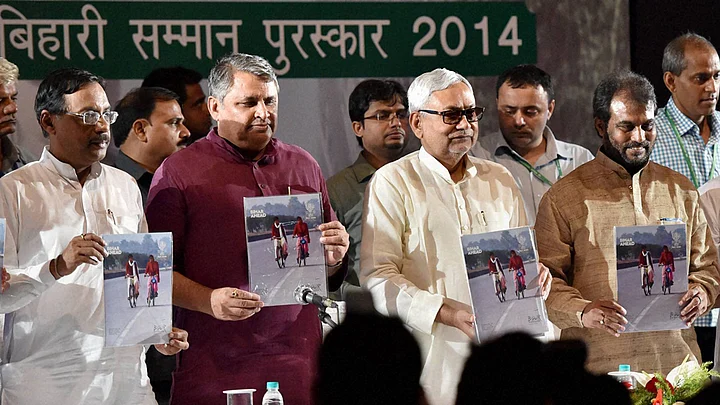Playing the Caste Card
- As Bihar assembly elections draw near, jat-paat ki rajniti seems to be at the centre stage
- Recent studies showcase the primacy of economics in impacting voting behaviour
- BJP as well as the JD (U) are leaving no stone unturned to ensure a lion share of the OBC votes
Bihar now has a new governor. But the only thing that is being discussed is the caste of the new incumbent.
The state government tabled the report of the inquiry commission probing the 1989 Bhagalpur riots last week. Questions have been raised about the timing of making such a report public.
From the choice of leaders for gubernatorial positions to the timing of publication of a commission of inquiry’s report, from the debate on death penalty to the selection of a venue for an election rally, politicians seem to have the habit of turning the pages of identity politics to draw inspiration from. As Bihar goes to assembly elections in a couple of months, jat-paat ki rajniti seems to be at the centre of what political parties are doing and saying. Does this signal a growing disconnect with the people?
Good Economics Becoming Good Politics
Recent studies have shown the primacy of economics in impacting voting behaviour of people. Milan Vaishnav, an associate with the South Asia Programme for the Carnegie Endowment for International Peace, concludes that “an improvement of one percentage point in a state’s growth rate in the 2000s is linked to a greater than 9% increase in the likelihood that the incumbent will be re-elected, a four percentage point gain in seat share, and a 1.3 percentage point rise in vote share.”
I got enough hints to that effect during a recent visit to Bihar. That Yadavs, or at least a section of them, are openly saying that Lalu Prasad’s extended rule in Bihar meant nothing for them. That Lalu promoted his family and did very little for members of the community. Similarly, I heard voices of dissent among Kurmis, a caste Bihar chief minister Nitish Kumar belongs to.
Their main grudge: Nitish took their votes for granted. I heard similar voices among other social groups signalling weakening of the association of caste with the way people have tended to vote thus far. The fact that an assortment of caste groups, some at odds with others, voted for the Bharatiya Janata Party (BJP) in the 2014 Lok Sabha elections lends credence to the view that the hold of caste over politics has diminished somewhat.
Premature Conclusion
Does this mean the beginning of the end of identity politics? It will be quite premature to arrive at such a conclusion. There is no denying that the role of primordial identity (caste, religion, region etc.) as the sole instrument of political mobilisation has diminished somewhat. But it has been replaced by an identity-plus syndrome. What works now is caste-plus or religion-plus. What it essentially means is that my elected representative must have some commonality with my surname. But he should deliver something tangible too.
“Modi’s Gujarat has almost everything we all want to have. If he gets a chance, we will get the same kind of opportunities everywhere. And he belongs to the social category we all have voted for all these years,” I heard different versions of this statement from a number of people when I traveled to several parts of Bihar prior to last year’s Lok Sabha elections.
They were the people who would not have otherwise voted for the BJP because of their caste affiliations. They were swayed as much by what they knew about the “Gujarat model of development” as also by the caste of the leader who had seemingly made it possible. I remember a small shopkeeper in Saran district telling me: “In the name of social justice, we have given 25 years to Laluji and Nitishji. What is the harm in giving five years to Modiji? After all, Modiji is also an OBC.” He was an OBC and said he had voted for Nitish Kumar in the past.
My Party Too Cares For You
Why has this change come about? Two factors have contributed to this change. First, it has been observed that in a constituency dominated by a particular caste or a religious group, most parties tend to field candidates belonging to the dominant group. The one who promises something extra and is seen to be delivering it wins the race.
Of course the party he/she belongs to does matter. But that adds to his winnability or, in some cases, proves to be a liability. In normal circumstances, a party and its leader is just one of the elements of the election package that separates winner from others.
Second, the competition among political parties to claim dominant social groups as their own has intensified over the years. In Bihar, for instance, the group that matters the most is that of OBCs. Both the major players – the BJP-led alliance and the Janata Dal (United)-led alliance – are leaving no stone unturned to ensure that they get a lion share of this group’s votes.
They will field maximum number of candidates from this group and promise a range of sops. The voters are then expected to exercise a choice on the basis what they perceive as credible identity-plus.
In what way will the new caste-plus syndrome impact electoral outcome in Bihar? My sense is grand claims will not work. Nor will blatant exhibition of identity politics. The credible promise of here and now nicely packaged with selected elements of identity politics will.
But the new reality will hit politicians only with a lag.
(The writer contributes regularly to the Business Standard)
